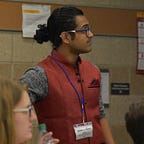(Going? Coming?) Home
“কি দাদা ? এতদিন পর পর এলে, কি করে চলবে ?”
It’d been 20+ hours of flying and transit, and I was tired. More tired than I cared to admit, because I was traveling home after almost 3.5 years. I put down my passport in front of the Immigration officer, and the navy blue Indian passport (is it me, or does it look black to anyone else?) was received with a familiarity I had long since seen at the many airports I had trudged in the recent past. My immigration officer, just settling in his seat to deal with passengers from the first international flight of the morning, sipped his coffee and put on his glasses. Was this his first cup of the long morning ahead, or the last cup pushing him through the end of the night? So many thoughts, so many familiar sights and sounds and smells — loud chatter, burnt tea, overhead announcements in Hindi and Bengali, the squeaking of trolley wheels that are as old as I am — but I needed to focus. Immigration is a serious place, I need to focus.
“৩ বছর পর বাড়ি ফেরা হচ্ছে ?”(“you are returning home after 3 years?”) the officer asked. I smiled and nodded. Even entering my own home country, immigration counters are not my favorite.
“বাংলা ভাষা মনে আছে ,নাকি এত বছর বিদেশে গিয়ে সব ভুলে গেছ ?” (“do you still remember the Bengali language, or have you forgotten everything after being abroad for so many years?”)
There was a familiarity in his smile, mixed with a sense of sadness and apprehension in his eyes that a Bengali boy with Kolkata as his permanent address and the immigration/travel record in front of him might have lost touch with his mother tongue. I responded in Bengali, perhaps to demonstrate proficiency, perhaps to respond to the evaluative undertones I’ve come to expect in Immigration officers.
“তাও ভাল, ভাষা মনে আছে, আর টান ও আসেনি এখনো |” (“good, you still remember the language, and have not picked up an accent.”)
A light smile, nudging up the sides of the white hairs on his moustache. A few minutes staring into the Immigration camera, a quick photograph taken and identity ascertained, followed by the loud yet relieving slams of my passport being stamped.
“কি দাদা ? এতদিন পর পর এলে, কি করে চলবে ?” (what brother? How can you only come back every so many years?”)
I had already passed the corner of his booth, so at this point I was standing almost next to his seat. A thin veil of Plexiglas separated us, an artefact meant to protect him from aggressive travelers but now functioning as the barrier between two hands itching to shake. I had no answer for him, and he soon turned his face back to his duty, as the next person behind me stepped up to his counter. As my fellow traveler slid his navy blue (black?) passport into the crescent-cut in front of him, I saw the side of my officer’s face, the corner of his moustache still edging slightly up.
“যান, ভাল থাকবেন | ভাল করে খেয়ে যাবেন |” (go, and be well. Eat well before you go.”)
As I came down the stairs and stood by the swirling snake of a conveyer belt separating me from the doors to the city I grew up loving, the stale and sticky airport air overpowering the aging central airconditioning and the just-loud-enough collective chatter of a thousand Bengali phone calls and muted conversations brought about an entirely involuntary smile. Immigration might remain a generally terrifying and anxious experience, but at least this was home. I was home.
If you’re an immigrant like me, or have been away from “home” for several years, either voluntarily or due to circumstances outside of your control, this is likely familiar to you. If it is, I invite you to think about this, and reach out: when traveling someplace, one of however many “homes” you have, do you think of it as “going home”, or “coming home”, or a bit of both? Do you think of it as “going” back to a place and people you call home, visiting for a brief period of time as you must travel back soon? Do you think of “coming” back to a place you remember like the back of your hand, reliving nostalgic and familiar moments like you never left?
Let’s talk.
